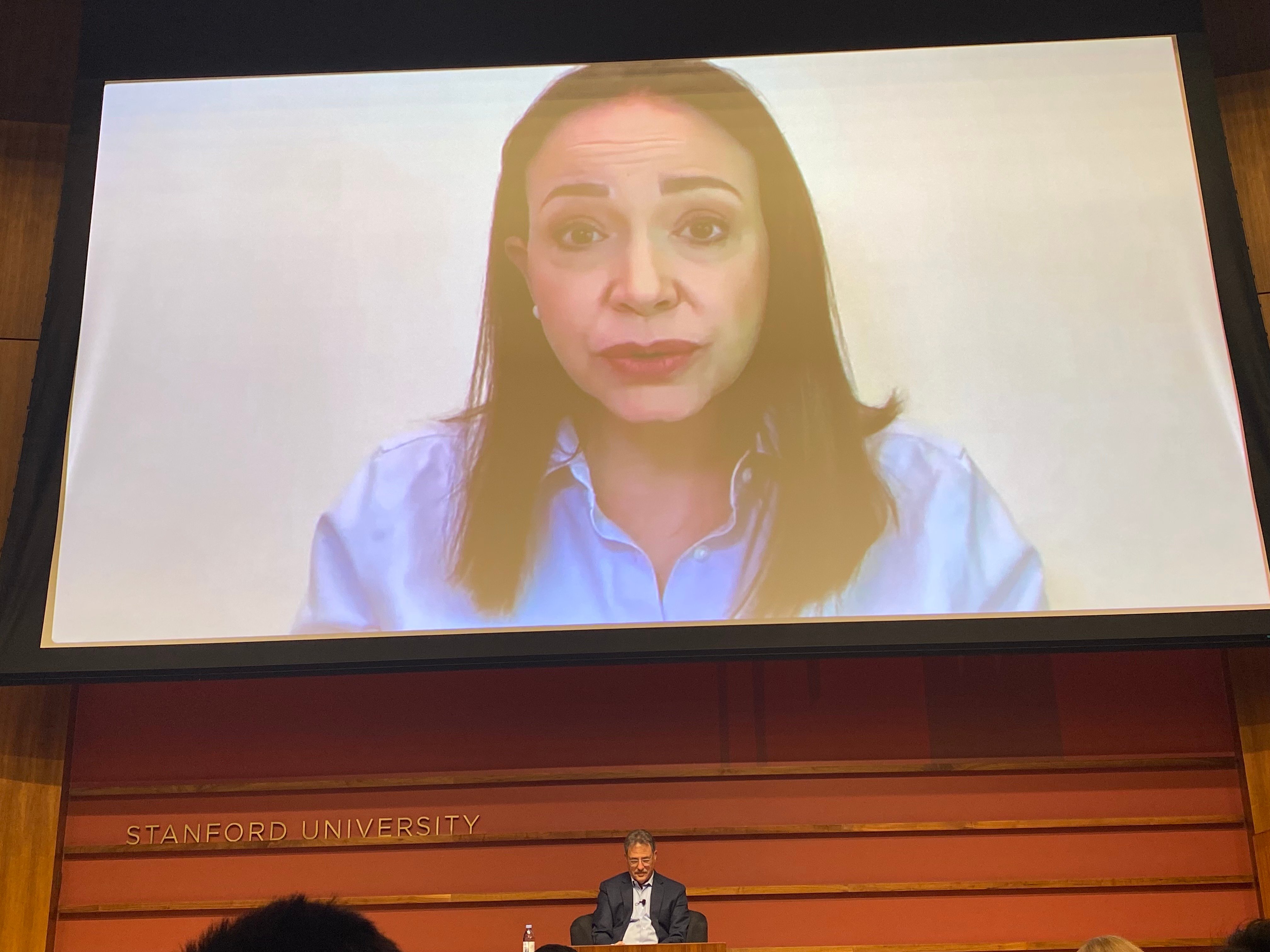María Corina Machado, the leader of Venezuela’s opposition movement, denounced the repressive tactics of Venezuela President Nicolás Maduro, at a Monday event. Machado promoted cooperation between Venezuela and other democracies on the international stage and shared her plans to crack down on organized crime in the country.
Machado was one of the four main leaders of the U.S.-led coup attempt against Maduro in 2019. In October 2023, Machado won a presidential primary organized by the opposition, garnering 93% support from an electorate of 2.4 million voters. In January, however, the highest court in the nation upheld a ban — put in place by Maduro’s government — on her running for public office.
The event was hosted by the Center for Democracy, Development and Rule of Law and moderated by Larry Diamond B.A. ’74, M.A. ’78, Ph.D. ’90, Freeman Spogli Institute for International Affairs senior fellow and a political science and sociology professor.
Machado, who joined the discussion via Zoom from an undisclosed location in Venezuela, was a primary architect of Edmundo González Urrutia’s victory in Venezuela’s July 28 presidential election.
Maduro has been president since 2013, when he took office in a snap election following the death of ex-President Hugo Chávez. Maduro, a socialist dictator, stifled political dissent and has taken control of the Venezuelan government’s checks and balances during his time as president. His “chavista,” or socialist, policies have caused hyperinflation, widespread food scarcity and failing healthcare systems. If Maduro cedes his position, Urrutia will be inaugurated on Jan. 10.
After being banned from the 2023 presidential election, Machado focused on bolstering the country’s opposition party. Campaigning for the party was a movement “owned by the people” that “surmounted ferocious repression,” Machado said on Monday. Maduro’s control over state institutions had made social media advertisements, posters and TV appearances futile.
“Against all expectations, overcoming every kind of obstacle and challenge, [the Venezuelan opposition party] was able to have a huge victory in the July 28 presidential election,” Machado said. “It was an unprecedented and unexpected win. The final outcome of this process is certainly existential for the Venezuelan people.”
To coordinate campaigning in the months leading up to the election, Machado led the creation of 600K — referencing the 600,000 volunteers that the opposition hoped to accrue, a network that connected supporters of the opposition movement. 600K’s network included election monitors, coordinators and workers responsible for “transmitting, in real time continuously, what was happening [regarding] the [election] process,” Machado said.
Machado also oversaw the establishment of “comanditos,” small oversight groups throughout Venezuela that observed voting centers during the election period and ensured ballots were properly collected and recorded. The network of comanditos, composed of over one million volunteers, allowed the opposition to verify Urrutia’s win despite Maduro’s assertion as rightful winner of the election.
On Tuesday, the U.S. government formally recognized Urrutia’s presidential win.
“The Venezuelan people spoke resoundingly on July 28 and made Edmundo Gonzalez the president-elect. Democracy demands respect for the will of the voters,” Secretary of State Antony Blinken announced on X.
If the United States can continue to appreciate the importance of and help facilitate a peaceful transition of power, “Venezuela will represent the main opportunity for democracy in the Americas,” Machado said.
Machado hopes to disincentivize emigration by improving citizens’ quality of life, reducing organized crime by minimizing Venezuela’s notoriety as a “safe haven territory for international agents on retirement from their home countries” and “tak[ing] advantage of the huge potential in [the country’s] energy resources,” Machado said.
Machado outlined four dimensions of a comprehensive plan for Venezuela’s role in the international stage, which she hopes to implement if Urrutia is not prevented from ascending to the presidency in January. The dimensions include engaging in diplomacy that recognizes Maduro’s corruption, a system of transnational law enforcement to reduce drug trafficking in Venezuela, facilitating the intervention of the International Criminal Court in prosecuting corrupt officials and ensuring unbiased, international media coverage of the situation to counteract the corruption of state news outlets.
Although Machado is willing to “do what it takes” to achieve foreign policy successes, she said the country needs “to have the commitment that the international community should move from joint statements to joint actions. This is a moment to put them in place.”
To Marcelo Peña ‘25, the event coordinator, Machado is “a beacon of hope for all of Latin America.”
“Democracy is hard to keep, and in a place where it was lost, like Venezuela, these amazing fighters like María Corina and the opposition movement are really inspiring,” he said. “For me, it was amazing to see how she wasn’t hiding. [She] had a message of hope that resonates a lot with me.”
Diamond said Machado is “one of many extraordinary and unbelievably courageous democratic leaders in this world at this time of great testing for democracy.” Machado has “stood by [her] people and stayed in [her] country to represent aspirations for freedom at the moments of maximum existential danger for [Venezuela],” Diamond said.
Machado emphasized the importance of young people in the fight for freedom from Maduro’s rule and, consequently, for democracy.
“A country that was divided, hopeless and demonized has turned into this vibrant society, longing and fighting for democracy and freedom,” Machado said. “We decided to reach out. We decided to listen, to understand, to heal and, I would say, most importantly, to trust each other.”
Correction: A previous version of this article mischaracterized Machado as a leader of Venezuela’s pro-democracy movement. This article was updated to clarify Machado’s involvement in the 2019 coup attempt against Maduro. The Daily regrets this error.
